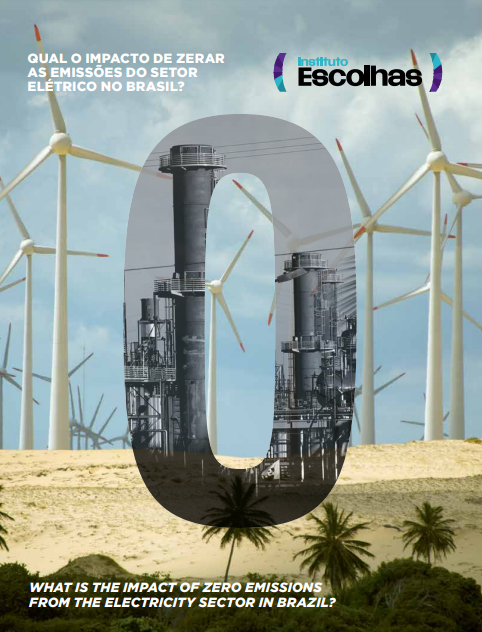This website uses cookies so that we can provide you with the best user experience possible. Cookie information is stored in your browser and performs functions such as recognising you when you return to our website and helping our team to understand which sections of the website you find most interesting and useful.
Study indicates economic, social and environmental impact of having zero emissions from the Brazilian electricity sector

Measure would be important in reducing emissions and have practically no impact on GDP and income in the country
The study What will be the impact of having zero emissions from electricity generation in Brazil by 2050?, launched recently by the Escolhas Institute, shows that the transition to a zero-carbon electricity sector in Brazil by 2050 would play an important role in reducing emissions from the energy sector and have practically no impact on GDP and family income. The objective of the initiative was to verify the relevance and the impact of implementing Brazil’s international commitment to reducing greenhouse gas emissions (GHG), considering the targets of the electricity sector, which aim to increase the share of non-hydro renewable sources – such as biomass, solar and wind – to at least 23% of the Brazilian electricity matrix by 2030.
To achieve this, optimistic and pessimistic economic growth scenarios were considered, in addition to the context of zero-carbon. In this way, it was possible to understand from the outset how Brazilian industry will perform in the long term and how this can affect the structure of energy demand. Based on this, the study proposed to examine the macroeconomic and social impacts implementation of a zero-emissions electricity sector would have on GDP, income, consumption and electricity consumption, emissions and the sector itself.
The study considered energy security in the system, which includes issues related to the intermittence and disruption of energy sources: availability of water for hydroelectric and thermal plants or wind, for example, incorporating the risk of climate change. For this purpose, the Escolhas Institute collaborated with the Energy Research Company (EPE), which specially estimated the supplementary power to be installed in each of the four scenarios evaluated, in order to guarantee energy security.
The conclusion drawn by the Escolhas Institute is that the cost to GDP of a transition to a zero-carbon electricity sector would be insignificant, less than 0.2% in 2050. The same is true for household income, with an impact smaller than 0.5 % in 2050. In contrast, the reduction of greenhouse gas emissions in the electricity sector was significant: if emissions from the electricity sector were zeroed in 2050, there would be a reduction of 58.5 Mt CO2e, in the optimistic scenario for the economy, a figure higher than the emissions from burning gasoline throughout the national fleet of vehicles in 2010. When a pessimistic scenario is considered, the reduction would be 40.1 Mt CO2e, a value greater than CO2e emissions from waste from the whole of Brazil in 2010.
The Brazilian electricity sector has a high share of renewable energy – 74% in 2015, according to the Ministry of Mines and Energy (MME). Even so, solar, wind and biomass sources can increase their share in the electricity matrix and completely replace fossil sources in the scenarios studied, with the country’s energy security guaranteed. Estimates of the risks of climate change for power generation still bring uncertainties, but there seems to be consensus that wind power in Brazil would potentially benefit. In the case of the scenarios developed for this study, wind energy would gain significant importance and would see a large increase in installed capacity (almost 80 GW installed, or 27% of the total installed capacity in wind energy, a source potentially benefited by climate change, in the optimistic scenario).
“The study helps demonstrate that the transition to a zero-emissions electricity sector will not have significant economic impacts for Brazil, contrary to existing perceptions. This becomes even more important when it is verified that zeroing these emissions helps Brazil to play its part in the fight against climate change and global warming,” according to Sérgio Leitão, Director of Relations with the Society of the Escolhas Institute.
The executive summary of the report is available at: https://goo.gl/TPH5mF. For the complete version please access: https://goo.gl/nLG6RJ.
Related
Brazil has 1 million hectares of forests to restore in rural settlements resulting from the agrarian reform
Forest Recovery can create over 5 million jobs
Researchers and companies must recognize the rights of holders of traditional knowledge
Recovering forests on small farms could produce 156 million tons of food

 Texto
Texto
